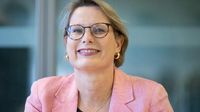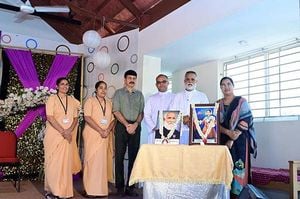On May 8, 2025, a significant reshuffle in the German government took place as the Social Democratic Party (SPD) appointed three new ministers, marking a pivotal moment in the nation’s political landscape. Verena Hubertz, Stefanie Hubig, and Katherina Reiche are stepping into key roles that will shape the future of construction, justice, and economic affairs in Germany.
Hubertz, a rising star within the SPD, has been named the new Minister for Construction and Housing. Her appointment comes at a time when the construction and real estate sectors are facing numerous challenges, and her role will be crucial in addressing these issues. Hubertz's selection was somewhat unexpected, as her name had circulated in political circles but was not widely anticipated to be at the forefront of the new cabinet.
Meanwhile, Stefanie Hubig, previously the Minister of Education in Rhineland-Palatinate, takes over as the Minister of Justice and Consumer Protection. Hubig's extensive background in law and her experience within the justice system are expected to serve her well in this new position. She has already expressed her commitment to tackling pressing issues, including the controversial topic of how to handle the far-right Alternative for Germany (AfD) party, which has been labeled as extremist by the Federal Office for the Protection of the Constitution.
“We are a resilient democracy; we must protect ourselves against enemies of the constitution,” Hubig stated in a recent interview, emphasizing the need for a balanced approach in dealing with the AfD while adhering to the rule of law.
Katherina Reiche, representing the Christian Democratic Union (CDU), has been appointed as the Minister of Economic Affairs. Her role will be vital in steering Germany's economic policies and fostering growth in the wake of recent challenges faced by the economy.
The SPD’s new cabinet members have made bold promises shortly after their appointments. Lars Klingbeil, the new Finance Minister and Vice Chancellor, has vowed to reduce energy prices and stimulate economic growth through significant investments and reduced bureaucracy. “We want to create new economic strength with low energy prices and massive investments,” he asserted.
Stefanie Hubig has also announced her intention to prioritize the extension of the rent control law, known as the Mietpreisbremse, beyond its current expiration date at the end of 2025. “One of my first tasks will be to implement the agreed extension of the rent cap,” she told the press. This move is particularly important as the SPD and the Union have agreed to extend the rent control for four years in their coalition agreement.
Bärbel Bas, another newly appointed SPD minister, will oversee the Ministry of Labor, focusing on securing pension levels and improving labor market conditions. She has outlined her commitment to strengthening the labor market, ensuring good wages, and enhancing job placement services.
The SPD’s recent appointments come in the wake of a disappointing electoral performance, where the party secured only 16.5 percent of the vote in the last elections. Despite this setback, they managed to retain seven ministries and two state minister posts, showcasing a strategic maneuvering within the party.
The selection of these new ministers reflects a generational shift within the SPD, as younger faces are brought into prominent positions. This change is seen as a preparation for the next federal elections scheduled for 2029, with a focus on rejuvenating the party’s image and appeal.
Lars Klingbeil, who has emerged as a central figure in the new cabinet, views himself as an “investment minister” due to his responsibility for distributing a planned special fund of 500 billion euros. His role will be pivotal in shaping the financial strategies of the government, particularly in negotiations with the Union, which may have differing views on tax and fiscal policies.
Meanwhile, the cabinet reshuffle has not been without its controversies. Notably, Saskia Esken, the SPD co-chair, has not been given a ministerial position, leading to speculation about her future within the party. Critics have pointed to her as a key figure in the party's recent electoral struggles, raising questions about her leadership and influence moving forward.
As the new ministers settle into their roles, the expectations are high, especially from various stakeholders within their respective sectors. The German Association of Judges (DRB) has expressed optimism regarding Hubig’s appointment, stating, “It is an important signal that an experienced politician with a background in justice is taking on this ministerial role.”
In summary, the SPD's new cabinet members are gearing up to tackle significant issues that affect the lives of many Germans. With a focus on construction, justice, and economic revitalization, the new ministers will need to navigate a complex political landscape while fulfilling their promises to the electorate. The coming months will be critical as they begin to implement their agendas and respond to the ongoing challenges facing Germany.





